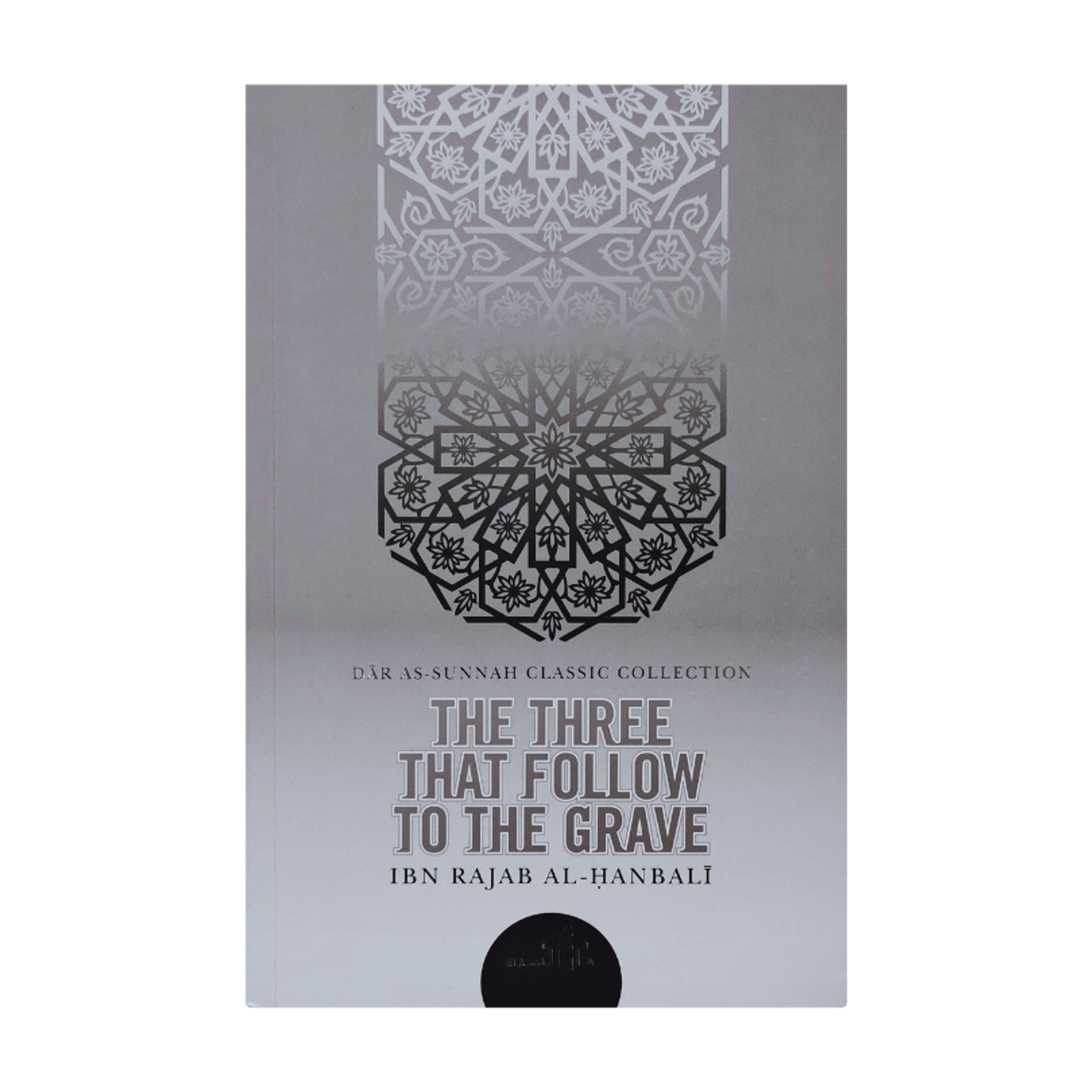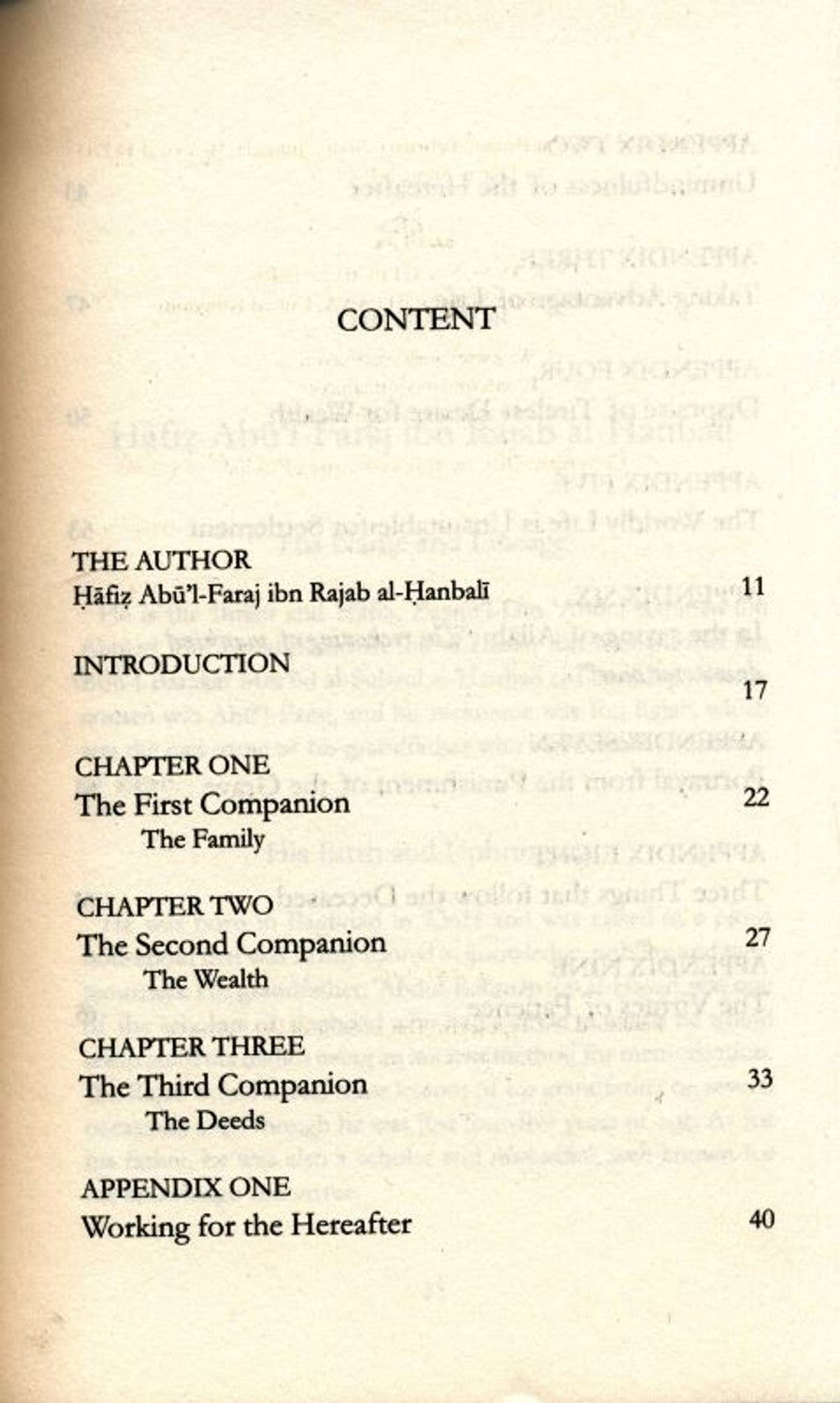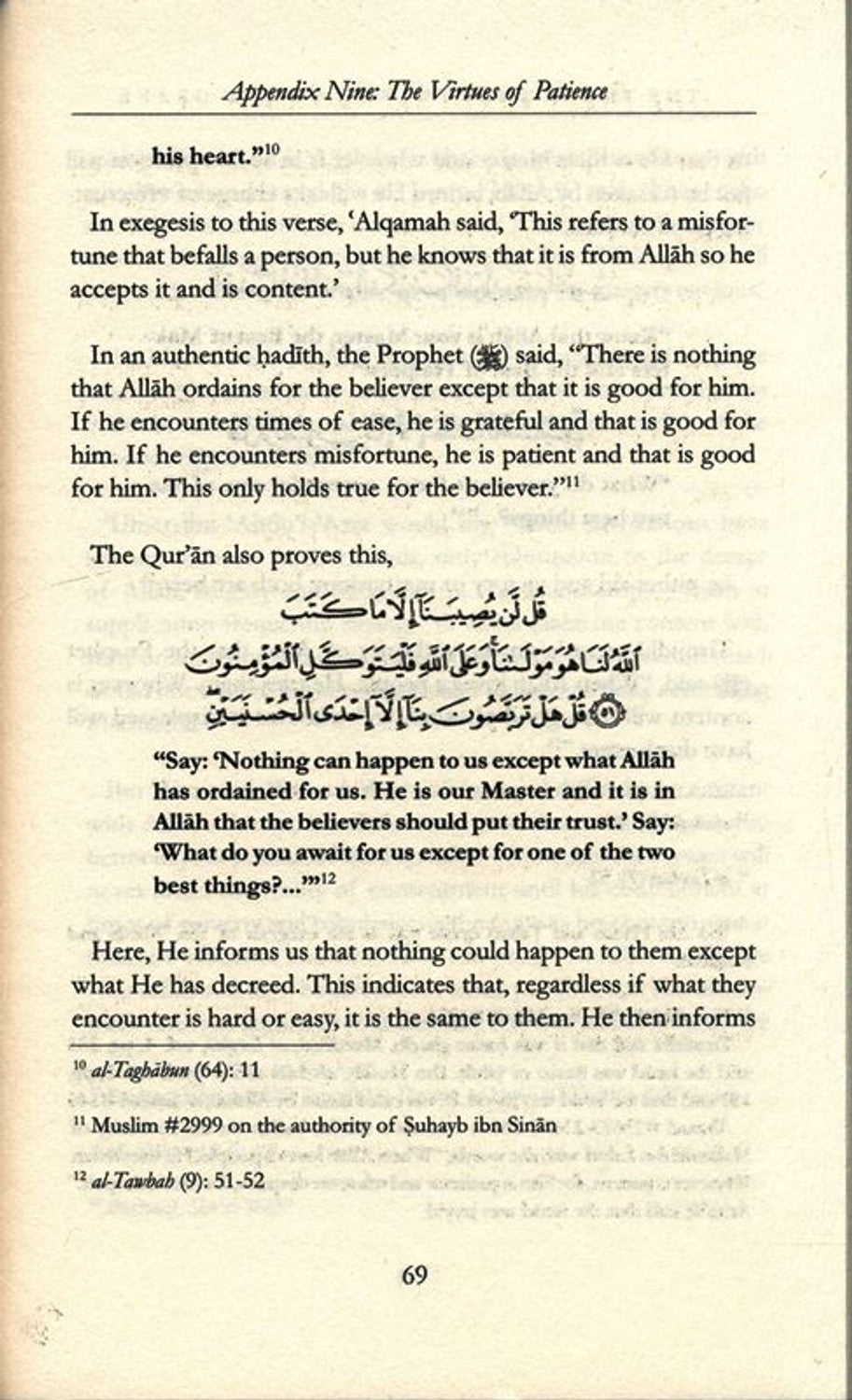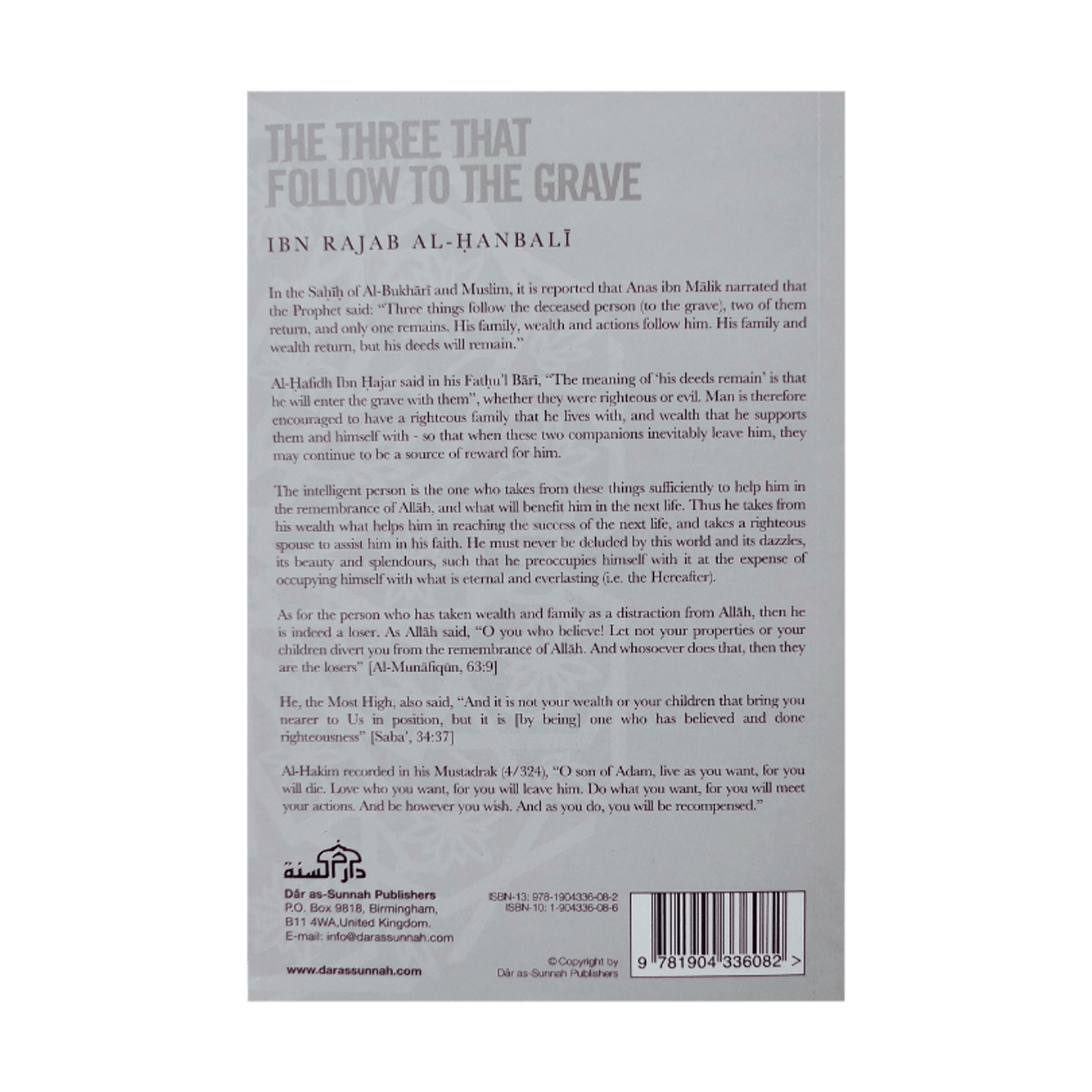The Three That follow To The Grave | Ibn Rajab Al- Hanbali
The Three That follow To The Grave | Ibn Rajab Al- Hanbali
Publisher:
Dar As Sunnah Publications
Author:
Ibn Rajab Al-Hanbali
Binding:
Soft Cover
Pages: 80
Size: A5 |5.8 x 8.3 in| 14.8x 21 cm
Couldn't load pickup availability




Collapsible content
Description of Book
According to the Sahih of Al Bukhari and Muslim, Anas ibn Malik narrated that the Prophet stated that three things accompany a deceased person to their grave: their family, their wealth, and their actions. While the family and wealth may return, their deeds remain with them.
Publisher
Dar As Sunnah Publications
Author
- Ibn Rajab Al-Hanbali
Sample Pages - Content
Page : 01
DAR AS-SUNNAH CLASSIC COLLECTION THE THREE THAT FOLLOW TO THE GRAVE IBN RAJAB AL-HANBALİ
Page : 02
Hafiz THE AUTHOR CONTENT Aban Hafiz Abu'l-Faraj ibn Rajab al-Hanbali 11 INTRODUCTION CHAPTER ONE The Family The First Companion ards wollof als zid word CHAPTER TWO The Second Companion The Wealth CHAPTER THREE The Third Companion The Deeds APPENDIX ONE Working for the Hereafter 17 22 27 33 40 0
Page : 03
Appendix Nine: The Virtues of Patience his heart."10 In exegesis to this verse, 'Alqamah said, "This refers to a misfor- tune that befalls a person, but he knows that it is from Allah so he accepts it and is content.' In an authentic ḥadīth, the Prophet) said, "There is nothing that Allah ordains for the believer except that it is good for him. If he encounters times of ease, he is grateful and that is good for him. If he encounters misfortune, he is patient and that is good for him. This only holds true for the believer."""1 The Qur'an also proves this, قُل لَّن يُصِيبَنَا إِلَّا مَا كَتَبَ اللَّهُ لَنَا هُوَ مَوْلَتَأْ وَعَلَى اللَّهِ فَلْيَتَوَكَّلِ الْمُؤْمِنُونَ GALERIJA قُلْ هَلْ تَرَبَّصُونَ بِنَا إِلَّا إِحْدَى الْحُسْنَيَيْنِ EW "Say: 'Nothing can happen to us except what Allah has ordained for us. He is our Master and it is in Allah that the believers should put their trust.' Say: 'What do you await for us except for one of the two best things?...12 Here, He informs us that nothing could happen to them except what He has decreed. This indicates that, regardless if what they encounter is hard or easy, it is the same to them. He then informs 10 al-Taghabun (64): 11 11 Muslim #2999 on the authority of Șuhayb ibn Sinan 12 al-Tawbah (9): 51-52 69
Page :04
THE THREE THAT FOLLOW TO THE GRAVE IBN RAJAB AL-HANBALI In the Sahiḥ of Al-Bukhari and Muslim, it is reported that Anas ibn Malik narrated that the Prophet said: "Three things follow the deceased person (to the grave), two of them return, and only one remains. His family, wealth and actions follow him. His family and wealth return, but his deeds will remain." Al-Hafidh Ibn Hajar said in his Fathul Bari, "The meaning of 'his deeds remain' is that he will enter the grave with them", whether they were righteous or evil. Man is therefore encouraged to have a righteous family that he lives with, and wealth that he supports them and himself with so that when these two companions inevitably leave him, they may continue to be a source of reward for him. The intelligent person is the one who takes from these things sufficiently to help him in the remembrance of Allah, and what will benefit him in the next life. Thus he takes from his wealth what helps him in reaching the success of the next life, and takes a righteous spouse to assist him in his faith. He must never be deluded by this world and its dazzles, its beauty and splendours, such that he preoccupies himself with it at the expense of occupying himself with what is eternal and everlasting (i.e. the Hereafter). As for the person who has taken wealth and family as a distraction from Allah, then he is indeed a loser. As Allah said, "O you who believe! Let not your properties or your children divert you from the remembrance of Allah. And whosoever does that, then they are the losers" [Al-Munafiqun, 63:9] He, the Most High, also said, "And it is not your wealth or your children that bring you nearer to Us in position, but it is [by being] one who has believed and done righteousness" [Saba', 34:37] Al-Hakim recorded in his Mustadrak (4/324), "O son of Adam, live as you want, for you will die. Love who you want, for you will leave him. Do what you want, for you will meet your actions. And be however you wish. And as you do, you will be recompensed." Dár as-Sunnah Publishers P.O. Box 9818, Birmingham, B11 4WA,United Kingdom. E-mail: info@darassunnah.com www.darassunnah.com ISBN-13: 978-1904336-06-2 ISBN-10: 1-904336-08-6 Copyright by 9 781904 336082 Dár as-Sunnah Publishers
Who is Ibn Rajab Al-Hanbali?
Ibn Rajab al-Hanbali (1335–1393 CE) was a prominent Islamic scholar from the Hanbali school of jurisprudence, renowned for his deep knowledge of hadith, fiqh (Islamic jurisprudence), and Islamic spirituality. He is best known for his works on the virtues of the Islamic faith, such as Lata'if al-Ma'arif (The Subtle Blessings), which highlights the significance of Islamic holidays, acts of worship, and recommended practices. Ibn Rajab was also an expert in the science of hadith and authored works that discussed the lives and biographies of prominent scholars and the importance of piety and sincerity in worship. His scholarship continues to be highly regarded, especially for its emphasis on spirituality and ethical conduct.




